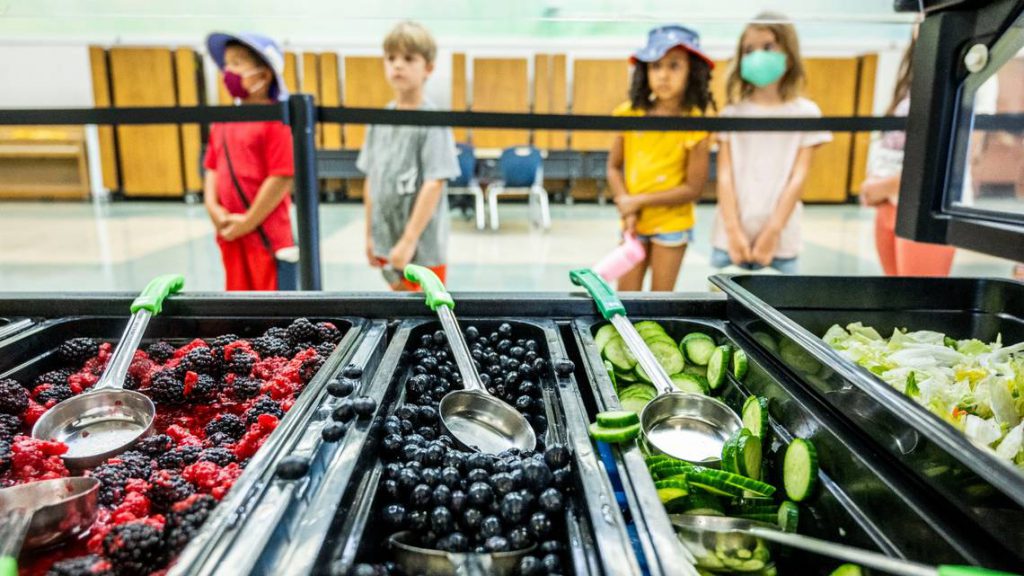Opinion piece by Kelsey Nederveld and Patrick Mulvaney
*Note – the Sacramento City Unified School District received $376,500 in 2021 and $466,570 in 2022 through CDFA’s California Farm to School Incubator Grant Program to source local produce and help students identify and cook with the produce. Stay tuned for the next round of CDFA farm to school funding opening soon!
For many of the students in the Sacramento City Unified School District, school meals are their biggest meals of the day. When California passed School Meals for All in 2021 in response to increasing child hunger, we became the first state in the nation to provide every student — regardless of income — free, nutritious breakfast and lunch, with more emphasis on fresh local ingredients. As the quality and nutrition of school meals improves, clear benefits are emerging, and more kids and families are participating.
The value of more kids enjoying school meals together is becoming evident every day in our kitchens and cafeterias. The stigma and shame that came with being very obviously a “free lunch kid” is diminishing; and the sense of community that comes with more kids eating together from the same menus not only ensures that all kids eat more nutritious food, but also improves campus culture and relieves the strain on families as food costs skyrocket.
Our efforts to transition more of the 40,000 meals we serve each school day from prepackaged, highly processed foods to fresher, healthier, tastier food for kids demands continued investment in kitchen equipment and culinary training.
California’s Kitchen Infrastructure and Training (KIT) program provided $4.8 million dollars to Sacramento City Unified in 2022. This funding has allowed the district to create more efficient and welcoming cafeterias and provide training for its 400 nutrition employees in order to serve more locally sourced, freshly prepared food. The district now has three chefs on staff, is training staff to freshly prepare more menu items and has elevated many front-line workers to kitchen leads, providing rewarding and viable career paths.
The school district’s back-of-house operation includes a 50,000 square foot warehouse with capacity to store refrigerated, frozen and dry goods that are purchased locally as well as 14 delivery trucks which make daily deliveries to our 80 school sites. We procure locally grown and produced ingredients from local producers including fresh, raw chicken breasts and drumsticks from Foster Farms, mandarins from Penryn and apples from the Sacramento-San Joaquin Delta.
Local sourcing saves us money as food costs have soared: We save $90,000 a year in delivery costs by picking up our own apples rather than buying apples grown and shipped from outside the region or state. Buying local ingredients that don’t need to be overly packaged and transported long distances is also climate smart, especially when hundreds of farmers and local producers are within a few miles.
KIT funding has been used by districts throughout the state to meet the rising demand for free, nutritious meals which increased in the 2022-23 school year to 826 million meals served — up 2 million from 2018-19. Statewide, 92% of eligible local school districts opted-in to receive the 2022 KIT funds, demonstrating how much pent-up demand exists to replace inefficient and aged kitchen equipment, and to train and increase the skills of our school nutrition workforce.
It is critical that these investments continue so all schools can fully implement the benefits of California’s groundbreaking School Meals for All and Farm to School programs, dependent on KIT funding for continued success. We are making great strides toward making access to healthier food equitable in Sacramento schools and throughout the state, but we need KIT funding to ensure that we can expand these programs.
The benefits of healthy, locally sourced, free meals for all our kids are undisputed — improving academic performance and long-term health, fighting child hunger, boosting the local economy and giving school nutrition staff the tools and support they need to provide meals made with care and intention.
Sacramento is known as the Farm-to-Fork Capital of America and is increasingly gaining media attention on a national level. But the gift of our home grown foods shouldn’t only be enjoyed by those who dine in our restaurants; it should be shared with the thousands of kids in our schools.
Kelsey Nederveld is the assistant director for nutrition services for Sacramento City Unified School District. Patrick Mulvaney is the head chef and owner of Mulvaney’s B&L, a leader in Sacramento’s Farm-to-Fork movement and co-founder of the “Train the Trainer” program at American River College.




One Response to Sacramento brings “Farm to Fork” to local schools — from the Sacramento Bee